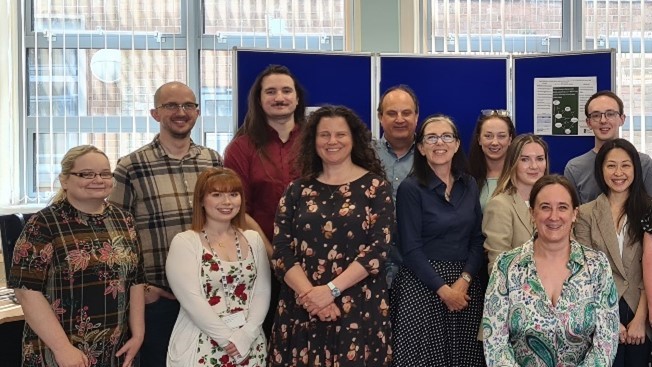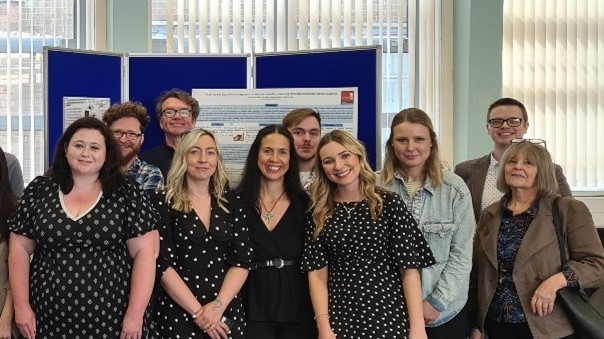The Department of Psychology were delighted to have been awarded funds through the British Psychological Society Undergraduate Research Assistantship Scheme. The scheme is a prestigious award that marks out a student as a future researcher and potential academic.
The BPS Research Assistantship Scheme is highly competitive, so the Department is proud to be successful in being awarded two summer internships in 2022 to Dr Alison Owen and Dr Sarah Rose.
One of the award holders, Heather Cassidy, who is working with Dr Alison Owen, has written a blog piece about her experiences studying BSc Psychology and Child Development and the focus for the research.
I have completed year 2 of BSc Psychology and Child Development and I am currently in my final year. During the second year I was really excited to have the opportunity to choose the research assistantship module to build experience to suit my future career plans.
I want to get as much research experience during my time at Staffs as I can, unlike some of the other option modules it had a limited number of spaces and I had to achieve a certain grade in research modules in year 1 to get one of the spaces. I had my fingers crossed that I got a place, and it did not disappoint. In fact, it was more than I could have imagined it was going to be. To be trusted to work on the research with the health psychology team was an amazing experience and opened doors of opportunity that have really made my journey at staffs both unique and tailored to me. The research I worked on was looking at breastfeeding and body image, I created adverts online to recruit participants, scheduled video appointments, wrote questions to ask and interviewed the participants for the study. I then transcribed the interviews and wrote my thoughts down of the generated themes to pass on to other researchers. As well as being my first experience of qualitative research, which helped with a further qualitative lab report on a core module in semester 2, the assistantship module provides an opportunity for reflection which will come in handy having had experience writing this ready for the year 3 project.
Wednesdays were my favourite day, I would have an occasional research assistantship lecture first thing, followed by a child development module. At the start of year 2 the first child development lecture asked the whole group what we wanted from the module as individuals. We all scribbled on post it notes and thought nothing of it, we studied the core material in semester 1 and then semester 2 arrived and the module had been set out each week to cover the topics the group had asked for in relation to careers. Each week we covered a different topic and various speakers came in to tell us how it related to their jobs, we heard from speakers working in various child psychology careers. We were taught how this connected to the material from semester 1 and how their diary looked in a typical week from clinical psychologists to family support workers. It was eye opening, and I know the group all enjoyed learning from people working in roles that they aspire to achieve after graduating next year. The child development lecturers always go above and beyond, and for me personally it really supported the notion of my experience being about me. I do not feel like I am a number on a register, my course is shaping my knowledge and putting the building blocks in place for my future career.
Year 2 has also demonstrated just how far I have come. I have done various other courses over the years, and I have never felt confident writing an essay before. At the start of year 1 I had used references in previous work, but I was still clueless about it, I just did it and hoped for the best. I remember my feedback from my first essay at staffs, my marker had written where is the intro? I was so confused, I had done a starting paragraph, nobody had ever pulled me up on my introduction style before. This allowed me to question what it was I needed to do, and it all fell in to place. I finally know how to write an essay. That may not be an achievement for others but for me it has been such a huge step and my marks have increased a lot as the course has gone on through all the teaching and feedback I have received at Staffs.
Outside of the planned lessons there is other support available to teach people study skills such as referencing and searching for journals, there is a section on the website where you can book in for any additional help you need. It is through the extra support available that it was finally picked up this year that I have ADHD. With this extra support it has enabled me to not only receive extra support, but it also puts the pieces into place for me of why I have always been capable of doing work, but the reason why I have struggled. This year has been life changing in so many ways academically and Staffs have truly supported and nurtured my development.
The golden egg moment for me this year was being put forward for a BPS award to take on a summer internship. I cried when I found out I had received it, but even if I had not received it, the fact that I was being able to put my own ideas forward for research and have people acknowledge that and have confidence in me to put me forward was an award in itself. The research I am currently working on is on the experiences of parents breastfeeding twins and multiples. During the assistantship module I interviewed around 15 women, only one was breastfeeding twins, based on her experience it opened my eyes to the differences she was experiencing as a mum of twins, and I suggested a twin study on the back of the research I had carried out in year 2. I have had the pleasure of working alongside Dr Alison Owen, Dr Jenny Taylor and Dr Amy Burton, all from Staffs health psychology department with experience in breastfeeding and qualitative research. Even just from writing the proposal to put forward to be considered I was able to learn how proposals are put forward, how to fill in ethics forms and carry out a literature review to use in the study. In August, I finished the literature searches, written the introduction, written questions, recruited participants, used Qualtrics as part of the recruiting process where there are around 170 detailed responses to use for the study as well as 19 video interviews I have carried out. I have been transcribing the videos ready to start the thematic analysis of both the videos and written responses over the next few weeks. I could not have pictured where this year would have gone, but it has been far greater than I could have imagined, and I am so thankful for the support I have received. I do not feel like I am at university to just get a degree and enter the job market, I truly feel like I am being given the skills I need to have a successful career in Psychology.
Interested in a Psychology degree? Come to an Open Day – for further details and to book your place at an open day please click here.
- BSc (Hons) Forensic and Criminological Psychology
- BSc (Hons) Psychology
- BSc (Hons) Psychology & Child Development
- BSc (Hons) Psychology & Counselling
- Undergraduate Psychology
- Postgraduate courses in Psychology




























